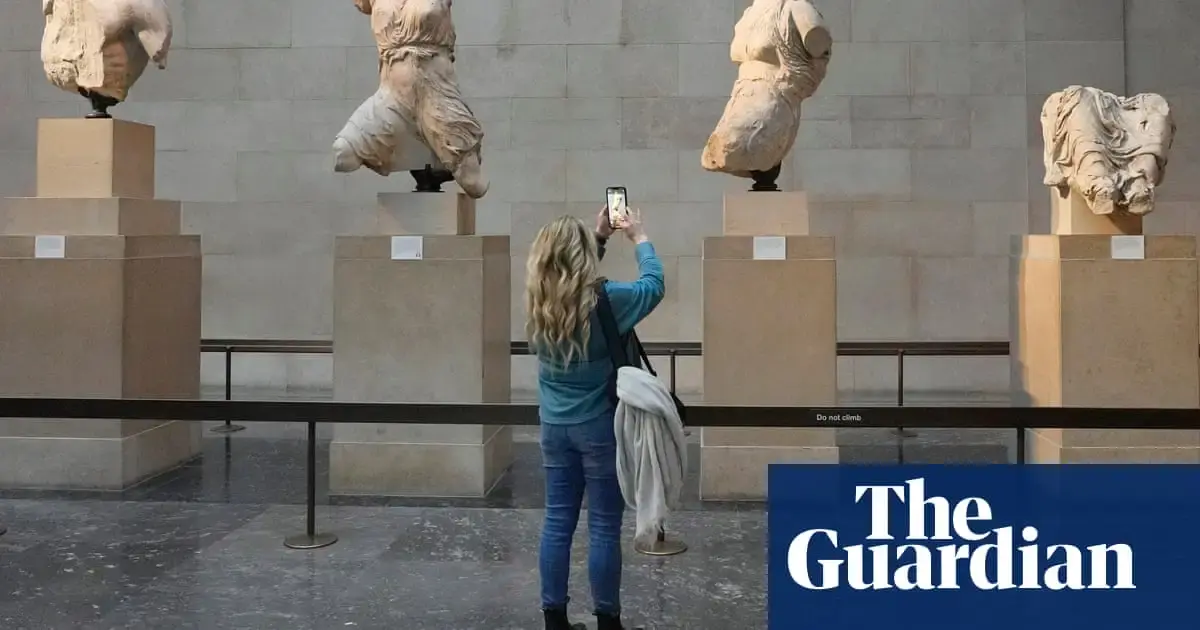- cross-posted to:
- europe@lemmy.ml
- cross-posted to:
- europe@lemmy.ml
Official says no sign of permit in Ottoman archives, in blow to British Museum, which defends legal right to statuary

I’m happy to hear England’s argument is crumbling before their eyes. These statues belong in Greece.

No one in England even cares about this. It’s literally just the government making random arguments up to throw at the right wing groups, it’s all political. Pretty much everyone would be absolutely fine if we gave them back.
The only people that care about any of this are basically fascists anyway and they won’t go and look at them they just want no one else to have them.

Even if they had permission from the Ottomans - it’s beyond meaningless.
It’s like arguimg Britain had permission from France to take [random African artifact located im a French colony] and therefore any and all claims by the affected country are now void.

I doubt the Ottomans had permission to take them from the Romans

The Brits are claiming that they had permission of the sultan, the governor and the city of Athens. However somehow no documents proving any of that are available in Turkey or Greece.
However Athens was part of the Ottoman Empire for 350 years and they had a lot more influence over it, then France had in Africa. It really is more like the Tsar giving permission to sell some mosaics from the Saint Sophia Cathedral in Kyiv.

How many fucking things has the British museum stolen? Every year I hear about something or another that they’ve stolen from other countries and refuse to return.

3D scan them, cast them, send them back.
Geez, somehow I didn’t even realize that they were named after the guy who stole them, not where they were taken from or anything about the culture they were made in. How gross is that?

im pretty sure i saw the greeks were already displaying replicas of them, should swap those with the thieves
This is the best summary I could come up with:
Greece has won an unlikely ally in its campaign to retrieve the Parthenon marbles from the British Museum after Turkey publicly rejected the claim that Lord Elgin had received permission from Ottoman authorities to remove antiquities from the Acropolis.
Boz, who also spoke to Greece’s state broadcaster, ERT, said the only evidence that had been found was an edict written in Italian but that it neither contained the sultan’s signature nor seal, which would have confirmed it had come from the Imperial court.
Crews working at the behest of Elgin began removing statuary from the monumental frieze that once adorned the Parthenon with marble saws and other machinery in 1801 – an endeavour that would take more than a decade.
Boz conceded she had felt obliged to intervene when the UK’s representative in a recent meeting of Unesco’s Intergovernmental Committee for Promoting the Return of Cultural Property in Paris reiterated that the sculptures were bought legally during the Ottoman era.
“The British Museum has always maintained that the treasures were purchased legally; it’s been its central argument,” said Irene Stamatoudi, a professor of cultural heritage law who advises the Greek government on the issue.
Describing the artworks’ restoration to the place where they were carved 5,000 years ago as a “national goal”, the Greek culture minister, Lina Mendoni, said Turkey’s intervention had essentially bolstered Athens’ case.
The original article contains 763 words, the summary contains 226 words. Saved 70%. I’m a bot and I’m open source!

On actually reading the article the headline seems misleading. They do not “reject the claim.” They say that they don’t have as much evidence to as would be necessary to fully prove it. I imagine they’d probably prefer not make the suggestion that they should have any involvement in the affair at all.

Museums that have non-indigenous material will have a tough time justifying why they are entitled to foreign heritage goods without running into a buzzsaw.
Waiting for the ultimate “finders, keepers” defense.

